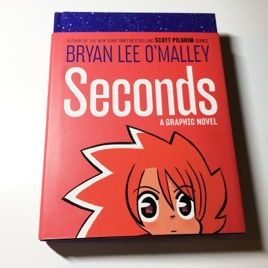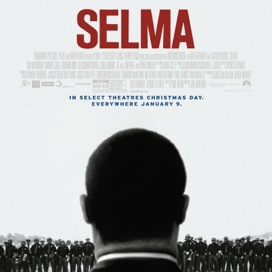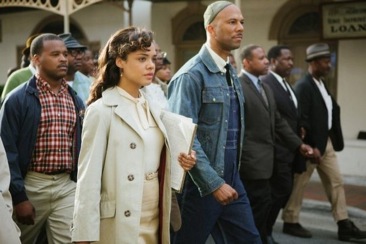Jan 2015
"Seconds" by Bryan Lee O'Malley
19/01/15 13:50 Filed in: Book Reviews
From the author that brought us Scott Pilgrim, Seconds is Bryan Lee O’Malley’s reset story, in the vain of Groundhog Day and Live Die Repeat. In a reset story there is typically a deus ex machine device that allows the protagonist to reset the day and relive the experience, always with the goal of perfecting it. The problems usually arise when the time space continuum is befouled by such shenanigans, and that’s no different here.
Seconds tells the story of Katie, the executive chef at the restaurant of the same name, and her group of friends. Despite her outward success, at 29 Katie has no ownership in Seconds so she is trying to start a new restaurant that she owns (Lucknow). She’s also trying to get over a relationship and deal with some supernatural going-ons at her residence (which happens to be the upstairs of Seconds).
While things are hectic, they don’t really go bad until an accident occurs one day at Seconds that burns one of the waitresses, the lovely Hazel. Katie is so remorseful about this situation – she partially caused it by fooling around with Andrew, her protégée – that she makes a deal with the devil of sorts. That night when she goes to sleep, she has a strange dream where she finds a red mushroom, a pad and a pen. There’re some instructions which tell Katie to write out her wrong, eat the mushroom, and go to sleep. She does this and the next day when she awakens she is able to play out the same scenario, but without causing the accident.
But other problems crop up. There is a house spirit at Seconds that is rather covetous of the red mushrooms and does not want Katie eating anymore (and for good reason). Also, with each iteration the world becomes more bizarre and uncontrollable for Katie.
The artwork in Seconds is far better than Scott Pilgrim. Katie’s cantankerous personality is humorously conveyed through O’Malley’s drawings, reminiscent of Charles Shultz at times. The colors jump off the page. It is truly a visual delight.
The story itself is likable enough. I get the feeling the movie Coraline had some impact on O’Malley, as you can feel the influence of that movie on this story. But Seconds stands on its own and it’s a real page-turner once it gets going. It also has some nice touches of reality, which are usually missing from O’Malley’s work. For instance, Katie drools when she sleeps. There’s also a great sequence where she meets her ex and gets a case of the runs due to eating a bad hamburger.
I’d give Seconds a strong recommend. It’s an enjoyable story with improved artwork over Scott Pilgrim.

Seconds tells the story of Katie, the executive chef at the restaurant of the same name, and her group of friends. Despite her outward success, at 29 Katie has no ownership in Seconds so she is trying to start a new restaurant that she owns (Lucknow). She’s also trying to get over a relationship and deal with some supernatural going-ons at her residence (which happens to be the upstairs of Seconds).
While things are hectic, they don’t really go bad until an accident occurs one day at Seconds that burns one of the waitresses, the lovely Hazel. Katie is so remorseful about this situation – she partially caused it by fooling around with Andrew, her protégée – that she makes a deal with the devil of sorts. That night when she goes to sleep, she has a strange dream where she finds a red mushroom, a pad and a pen. There’re some instructions which tell Katie to write out her wrong, eat the mushroom, and go to sleep. She does this and the next day when she awakens she is able to play out the same scenario, but without causing the accident.
But other problems crop up. There is a house spirit at Seconds that is rather covetous of the red mushrooms and does not want Katie eating anymore (and for good reason). Also, with each iteration the world becomes more bizarre and uncontrollable for Katie.
The artwork in Seconds is far better than Scott Pilgrim. Katie’s cantankerous personality is humorously conveyed through O’Malley’s drawings, reminiscent of Charles Shultz at times. The colors jump off the page. It is truly a visual delight.
The story itself is likable enough. I get the feeling the movie Coraline had some impact on O’Malley, as you can feel the influence of that movie on this story. But Seconds stands on its own and it’s a real page-turner once it gets going. It also has some nice touches of reality, which are usually missing from O’Malley’s work. For instance, Katie drools when she sleeps. There’s also a great sequence where she meets her ex and gets a case of the runs due to eating a bad hamburger.
I’d give Seconds a strong recommend. It’s an enjoyable story with improved artwork over Scott Pilgrim.
Comments
"Selma" Review
15/01/15 22:55 Filed in: Movie Review
Ava Duvernay's Selma is one of the best bio pictures produced in a while. For most people, it's difficult to watch a film of this kind. We know the outcome for its subject and we know what type of things to expect in a film like this - lofty speeches, brutal beatings and a good dose of historic footage. Instead of retreading old ground seen every February on the History Channel, the director chose a different route. This film focuses on events leading up to the 1965 march from Selma to Montgomery Alabama (about a 54-mile trip) which eventually led to the Voting Rights Act. What I really enjoyed about this film was that we saw MLK as a normal human being. We saw his fear and his passion co-existing side-by-side. And more importantly, we finally had a chance to get to know Coretta, which gives a better understanding of how MLK was able to achieve what he did in such a short amount of time. Behind every strong man, as they saying goes. Coretta was holding it down at home and supported him through thick and thin despite his less popular indiscretions.
While there has been some criticism of the portrayal of Lyndon Johnson, I felt it was accurate given the time. As president, Johnson seemed intent on supporting MLK but would not press forward without massive public opinion supporting him. The shooting death of Jimmy Jackson (who was African American) by Alabama State Trooper, James Fowler, was not enough to motivate Johnson to act. (Interestingly, Jackson’s death echoes police sentiment toward African-American males still prevalent today, half a century later). Meanwhile, the stark contrast of the public outcry that followed the death of James Reeb, a white minister from Boston who’d also come to support MLK during the March, revealed the nation’s covert racism. Reeb’s family received a phone call from the president but there was no such call for Jackson’s family.
I also think it was important to have a relatively unknown female director handle the subject matter. Duvernay avoided being heavy-handed with the violence and offered a well thought out balance between the female and male characters. Even Oprah Winfrey managed to just come across as an activist fighting for a cause instead of pulling us out of the story. The film made me proud of where we've come but also reminded me that we have a long way to go. Choices like not calling the film “MLK” and highlighting the contributions of so many others to this movement make it clear that this isn’t just a black issue - it ’s a human rights issue. If you haven’t seen Selma make it a point to do so immediately. It’s an important film that demonstrates the power of free speech and the courage of those who believe wholeheartedly in a cause.

While there has been some criticism of the portrayal of Lyndon Johnson, I felt it was accurate given the time. As president, Johnson seemed intent on supporting MLK but would not press forward without massive public opinion supporting him. The shooting death of Jimmy Jackson (who was African American) by Alabama State Trooper, James Fowler, was not enough to motivate Johnson to act. (Interestingly, Jackson’s death echoes police sentiment toward African-American males still prevalent today, half a century later). Meanwhile, the stark contrast of the public outcry that followed the death of James Reeb, a white minister from Boston who’d also come to support MLK during the March, revealed the nation’s covert racism. Reeb’s family received a phone call from the president but there was no such call for Jackson’s family.
I also think it was important to have a relatively unknown female director handle the subject matter. Duvernay avoided being heavy-handed with the violence and offered a well thought out balance between the female and male characters. Even Oprah Winfrey managed to just come across as an activist fighting for a cause instead of pulling us out of the story. The film made me proud of where we've come but also reminded me that we have a long way to go. Choices like not calling the film “MLK” and highlighting the contributions of so many others to this movement make it clear that this isn’t just a black issue - it ’s a human rights issue. If you haven’t seen Selma make it a point to do so immediately. It’s an important film that demonstrates the power of free speech and the courage of those who believe wholeheartedly in a cause.




